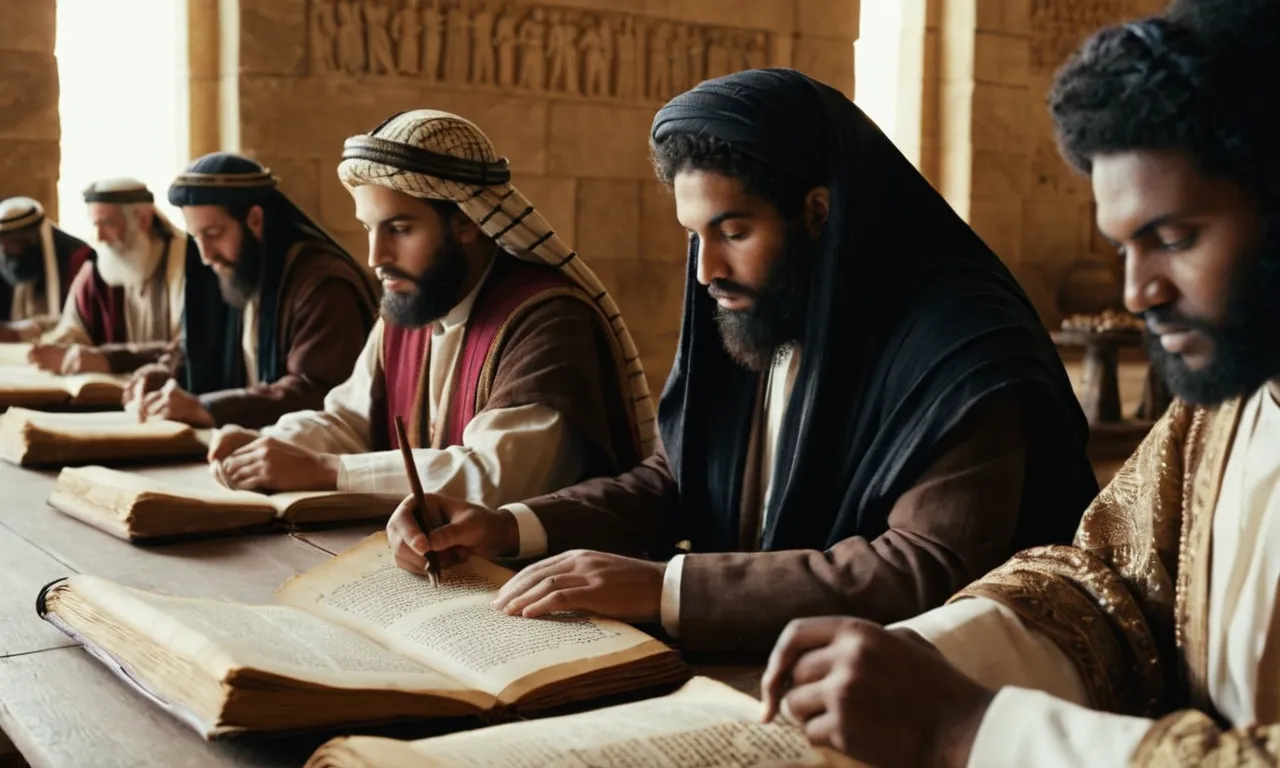Who Are The Israelites In The Bible?
The Israelites play a central role in the Old Testament narrative. But who exactly are the Israelites, and what is their significance in biblical history? This in-depth article will provide a detailed look at the origins, identity, and legacy of the Israelites.
If you’re short on time, here’s a quick answer to your question: The Israelites are the descendants of Jacob, who was the grandson of Abraham. They are God’s chosen people in the Old Testament, known for having received the law from Moses at Mount Sinai and for conquering and settling the land of Canaan.
In this approximately 3000 word article, we will explore the Israelites’ ancestry, their deliverance from slavery in Egypt, the giving of the Ten Commandments, their years of wandering in the desert, the conquest of Canaan, the establishment of Israel under kings like David and Solomon, the split into northern and southern kingdoms, the destruction of Israel by Assyria, the fall of Judah to Babylon, and the return from exile.
We will also discuss the lasting theological significance of the Israelites as God’s covenant people in the Old Testament.
The Ancestry and Origins of the Israelites
The Patriarchs: Abraham, Isaac and Jacob
The Israelites traced their ancestry back to Abraham, who God chose to be the father of a great nation. Abraham’s son Isaac carried on the family line, followed by Isaac’s son Jacob, who was later named Israel. Jacob had 12 sons who became the 12 tribes of Israel.
These three patriarchs – Abraham, Isaac and Jacob – received God’s promises that their descendants would become a great nation and inherit the land of Canaan.
Joseph and Enslavement in Egypt
Jacob’s favorite son was Joseph. After being sold into slavery by his jealous brothers, Joseph rose to become second-in-command to Pharaoh in Egypt. A famine brought the rest of Joseph’s family to Egypt seeking food.
Eventually the Israelites flourished in Egypt, but later Pharaohs enslaved them out of fear of their large population. The Israelites were forced into hard labor building Egyptian cities and temples for around 400 years.
Moses and the Exodus
After 400 years of Israelite slavery in Egypt, God raised up Moses to demand Pharaoh let God’s people go free. Pharaoh’s repeated refusals led God to send 10 plagues on Egypt, climaxing with the death of every firstborn son. Finally Pharaoh relented and released over 2 million Israelite slaves.
This event is known as The Exodus. God performed miracles to help His people cross the Red Sea safely. He then led them towards Canaan across the wilderness over the next 40 years under Moses’ leadership.
You can check Bible sites like Bible Study Tools for detailed commentary on the captivating story of the Israelites’ liberation from slavery in Egypt.
The Israelites at Mount Sinai
The Giving of the Ten Commandments
One of the most pivotal events in the history of the Israelites was when God gave them the Ten Commandments at Mount Sinai. After rescuing the Israelites from slavery in Egypt, God led them to Mount Sinai in the desert.
There, God established a covenant with the people of Israel and gave them laws to live by.
According to the biblical account in Exodus 19-20, as the Israelites camped at the foot of Mount Sinai, God descended upon the mountain in fire, smoke, and thunder. He called Moses to the top of the mountain, where He proclaimed the Ten Commandments – concise moral laws regarding idolatry, respect, honesty, purity, and more that were to guide the fledgling nation.
The Ten Commandments laid the ethical foundation for the Israelites and had a tremendous impact on their society. The first few commandments focused on the people’s relationship and duties toward God, commanding them to only worship Him.
The latter focused on interpersonal relationships – instilling values like honor, marital faithfulness, and respect for each other’s life, property, and reputation.
Obeying these commands allowed the Israelites to live in harmony with God and with each other. The Ten Commandments became the most influential set of moral rules in human civilization and are still relevant today in modern legal systems and ethics.
The Mosaic Covenant
In addition to giving the Ten Commandments, God also established an agreement with Israelites at Mount Sinai which is known as the Mosaic Covenant. This can be found in Exodus 19-24.
In this covenant, God promises to make Israel His “treasured possession” above all other nations if they wholeheartedly obey His commands. God pledges to be the Israelites’ protector and provider as long as they exclusively worship Him.
The people of Israel, for their part, agree to keep God’s decrees and laws.
The Mosaic Covenant establishes Israel as God’s chosen people and lays out the laws they must follow to maintain a right relationship with Him. This includes the Ten Commandments as well as several other regulations about worship practices, tithing, rituals, justice, and leadership.
Obedience would bring God’s favor and disobedience punishment.
The covenant was sealed in Exodus 24 when Moses splashed sacrificial blood on the altar and on the people, signifying the commitment between the Lord and Israel. It was subsequently renewed several times throughout Israel’s history – reminding the people of their special status before God and the responsibility that came with it.
The Mosaic Covenant forms the theological basis for Israel’s identity. It sets them apart, highlights their dependence on God, and shapes their religious practices. Elements of this covenant also foreshadow the coming of Jesus Christ and the new covenant that He would establish.
Wilderness Wanderings and the Settlement of Canaan
40 Years in the Wilderness
After the exodus from Egypt, the Israelites wandered in the wilderness for 40 years before settling in Canaan. As described in Numbers 13-14, Moses sent 12 men to scout out the Promised Land, but 10 of the spies feared the local inhabitants.
As punishment for their lack of faith, God condemned that generation, except Joshua and Caleb, to die in the wilderness over 40 years. During this period, the Israelites received God’s laws at Sinai and built the tabernacle for worship and sacrifice.
Yet they frequently complained and rebelled, testing God’s patience (Numbers 11; Numbers 16). Moses even struck a rock in anger rather than trusting God (Numbers 20:1-13). Finally, after the 40-year wilderness period, Moses died, and Joshua succeeded him to lead the Israelites across the Jordan River into Canaan.
The Conquest of Canaan under Joshua
After 40 years in the wilderness, Joshua led the Israelites across the Jordan River into Canaan, the Promised Land. According to Joshua 10:40, Joshua “conquered the whole region—the hill country, the Negev, the western foothills and the mountain slopes, together with all their rulers” through dramatic victories empowered by God.
Jericho’s walls collapsed after the Israelites marched around the city blowing trumpets (Joshua 6). During the conquest, the sun and moon stood still for Joshua (Joshua 10:13) and God hurled hailstones down to defeat their enemies (Joshua 10:11).
Key battles often centered around taking cities that controlled trade routes. Conquered cities were “declared to be under the ban” (Joshua 6:17-18) where property was dedicated to God by destruction or it became part of “the treasury of the Lord’s house” (Joshua 6:19).
Though the conquest took 6-7 years and the Israelites coexisted with some peoples, Joshua allotted tribal territories throughout Canaan before he died, largely accomplishing God’s command to take the land.
The Kingdom of Israel
The United Monarchy under Saul, David and Solomon
The united monarchy refers to the kingdom established under the leadership of Saul, David and Solomon in the 11th – 10th century BCE. This was a time of expansion and growth for the Israelites.
Saul was the first king of Israel, though his reign was turbulent and brief. David, who famously defeated the giant Goliath, oversaw the capture of Jerusalem and established it as his capital. Under David’s rule, the kingdom defeated the Philistines and other rivals, gaining control over crucial trade routes.
David’s son Solomon presided over a peaceful and prosperous united kingdom. Famed for his wisdom, Solomon built the first holy Temple in Jerusalem, strengthening Israel’s religious identity. However, towards the end of his reign, Solomon introduced pagan practices that ultimately led to unrest.
The Divided Kingdoms of Israel and Judah
After Solomon died around 930 BCE, tensions came to a head. The united monarchy split into the northern Kingdom of Israel and southern Kingdom of Judah.
Israel had nine different dynasties rule over about 210 years. Political instability, military coups and foreign invasions characterized much of this time. In 722 BCE, the Assyrian Empire conquered Israel, exiling its people and scattering them across their empire.
In contrast, Judah remained unified under the Davidic dynasty. Though also facing external threats, Judah survived as an independent nation for over 130 years outlasting Israel. However, in 586 BCE the Babylonians sacked Jerusalem, destroying the Temple and exiling much of the population.
The dividing of the once strong united monarchy left the Promised Land fractured for centuries. It was a devastating blow from which Israel and Judah never fully recovered prior to Roman rule.
Exile and Return
The Assyrian Conquest of Israel
In the 8th century BCE, the Assyrian empire conquered the northern kingdom of Israel and deported many Israelites, scattering them across their empire. This deportation is known as the Assyrian exile. The Assyrians conquered Israel in several waves, destroying the capital Samaria in 722 BCE after a 3-year siege.
Tens of thousands of Israelites were forcibly relocated to Assyria and Media, leaving only a remnant population in the former kingdom. This broke the power of Israel and effectively ended the existence of the northern kingdom as a political entity.
The Assyrian conquest fulfilled prophecies in the Bible that judgement would come upon Israel for its idolatry and injustice.
The Babylonian Exile
In the early 6th century BCE, the Babylonian empire under King Nebuchadnezzar conquered the southern kingdom of Judah and destroyed Jerusalem and the Temple. Many of the elite and skilled were deported to Babylon. This deportation is known as the Babylonian exile.
It began in 597 BCE when King Jehoiachin and his court were deported. After continued rebellion, Nebuchadnezzar returned in 586 BCE, destroying Jerusalem and deporting thousands more. The exiles lived in settlements along canals in Babylon.
Life was hard, but some like Daniel gained favor in the Babylonian court. The exile was fundamental to Jewish identity, forcing them to find ways to worship away from the Temple. It inspired a rich body of lament literature seen in Psalms and prophetic books.
The Return from Exile
In 539 BCE, the Persian empire under Cyrus the Great conquered Babylon. Shortly after, Cyrus issued an edict allowing exiled peoples including the Judeans to return home. He also returned looted Temple items. This ended the exile after 47 years.
Many Judeans returned over the next decades to rebuild Jerusalem and the Temple, completed in 516 BCE. Key Jewish leaders like Zerubbabel, Ezra, and Nehemiah led the return and restoration. The return shaped Judaism in significant ways. The Temple was rebuilt but on a smaller scale.
Local synagogues became central for worship and learning. Scribal schools arose, laying the foundations for Rabbinic Judaism. Prophets like Haggai, Zechariah, and Malachi provided guidance. The exile and return stirred Jewish hope for full restoration under a new Davidic king.
Theological Significance as God’s Chosen People
The Israelites have profound theological significance in the Bible as God’s chosen people. Though all people are created in God’s image, the Israelites were selected for a special covenantal relationship with Yahweh.
God promised to bless the Israelites and make them into a great nation, while the Israelites were called to worship God alone and live according to divine laws (Genesis 12:1-3; Exodus 19:5-6). This special relationship shaped Israel’s identity and mission.
Several important theological themes emerge from Israel’s election as God’s chosen people:
Covenant Theology
The belief that God established binding agreements or covenants with His people is a central biblical theme. The Abrahamic, Mosaic, Davidic and New Covenants all reveal God’s initiative in graciously relating to humanity through covenant partnerships (Genesis 15; Exodus 19-24; 2 Samuel 7; Jeremiah 31).
Mission Theology
God blessed Israel to be a blessing to “all peoples on earth” (Genesis 12:3). Israel was called to be a light to the Gentiles and spread knowledge of Yahweh worldwide (Isaiah 42:6; 49:6). This global mission mandate continues today for the church, the “new Israel.”
Redemptive History
Israel’s story from Genesis to Malachi unveils God’s redemptive, saving plan for creation. The Old Testament is fundamentally about how God is reconciling the world to Himself through Christ (2 Corinthians 5:18-19). Israel’s history points forward to the Messiah.
Kingdom Theology
God’s reign is a central thread in Scripture. Divine kingship was expressed through the Torah, the Davidic monarchy and the prophetic hope of a future, perfect kingdom. Jesus announced that God’s kingdom was breaking into the world through Him (Mark 1:15).
The Israelites were chosen to reveal God’s glorious kingdom.
Substitutionary Atonement
Israel’s sacrificial system (especially on the Day of Atonement) foreshadowed Christ’s work as the ultimate, perfect sacrifice for sin (Hebrews 10:1-18). Jesus fulfilled Israel’s destiny to atone for humanity’s rebellion against God.
Conclusion
In summary, the Israelites are the descendants of Abraham through Jacob who experienced a special covenantal relationship with God. As God’s chosen people in the Old Testament, they received the law at Sinai, conquered the Promised Land, formed great kingdoms under David and Solomon, endured exile and destruction by Assyria and Babylon, and eventually returned to rebuild Jerusalem.
Their tumultuous history and enduring status as God’s covenant people give the Israelites profound theological significance in the biblical narrative.








